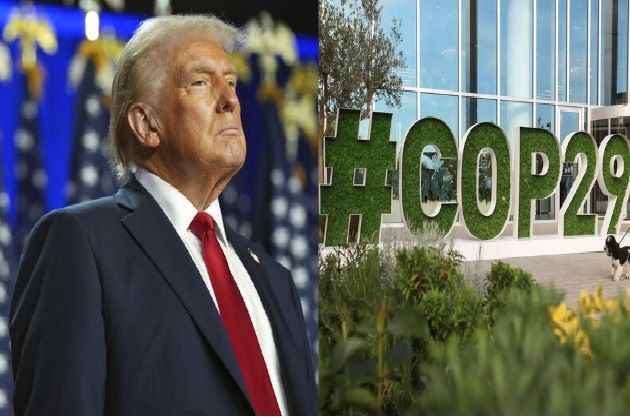With the defeat of Kamala Harris in US presidential election, the Democrats are busy putting their own house in order. A weak Opposition will give the new US president - Donald Trump - a free run in key policy decisions. To the great dismay of climate activists, the US stance on climate diplomacy will surely be the first casualty among the many U-turns that the world awaits from the new Trump administration. Trump's intention to exit the Paris agreement again if re-elected has been a major poll promise by Republicans, indicating a policy of non-engagement in international climate efforts.
Trump has repeatedly expressed skepticism over climate change, often referring to it as a hoax or a scam designed to hurt American businesses. During his campaign for the Presidential race, Trump promised to reverse many of the policies of the Biden administration on climate, notably the Inflation Reduction Act. He calls them part of the “green new scam”, focusing particularly on subsidies for electric vehicles and renewable energy projects. “Why aren't we creating great energy plants, great sources of energy, instead of playing this game with wind that is ruining everything, killing all your birds, destroying the fields... It's a green scam,” said Trump in one of his speeches after the election victory.
Trump's slogan “drill, baby, drill” was frequently used to signify his intent to boost oil, gas and coal extraction, arguing that this would lead to lower energy prices and energy independence.
Within six months of his first presidency in 2017, the then US President Donald Trump had announced his intention to withdraw the U.S. from the Paris Climate Agreement, citing unfair economic burden. Earlier, the Paris accord agreed upon by 196 countries during COP21 in 2015 was hailed as a significant act of climate diplomacy aimed at reducing global greenhouse gas emissions.
Trump's stand on "Green Energy" has been very clear. In September 2016, the U.S. formally ratified the Paris Climate Agreement setting the goal to keep the global temperature rise well below 2 degrees Celsius. Within a year, Democrat nominee Hilary Clinton lost to the Republican, Donald Trump. Over the next four years, the Republican leadership reneged on many treaties, commitments and alliances worldwide, the Paris Agreement being one of them.
On January 20, 2021, on his first day in office, President Biden signed the instrument to bring the United States back into the Paris Agreement. "Addressing the real threats from climate change and listening to our scientists is at the center of our domestic and foreign policy priorities,” said a statement from the state department, which came within a few weeks of Biden assuming office.
To keep his plans from being reversed by future administrations, Trump has also hinted on the US possibly exiting the broader United Nations Framework Convention on Climate Change, which would make rejoining the Paris Accord more difficult for any new government.
Interestingly, while environmentalists may argue that Trump’s policy on environment and climate issues could derail the global consensus and climate efforts; among his supporters, these policies resonated with themes of economic growth, job creation in traditional energy sectors.
One must remember that on the domestic front Trump’s proposals on economic growth, taming inflation and creating jobs did play a big part in his historic win over demarcate nominee Kamala Harris.
The U.S. has been historically one of the largest contributors to global carbon dioxide emissions. Out of the total CO2 emissions from fossil fuels and industry since 1850, the US has contributed a huge percentage of about 20%.
Despite being the world's largest emitter, China's per capita emissions stand at about half of the US at 7.4 metric tons per person. On the other hand, India’s per capita emissions are much lower, at around 1.9 metric tons due to lower industrial activity per person and a significant portion of the population still using traditional biofuels for cooking.
The US, a big player which has to be onboard on any major policy issue on climate in order to have any real outcome, is going through a churning as far as its internal policy decisions are concerned. Trump's climate policies have been met with concern internationally, with fears that they could disrupt or slow down global climate efforts.
The US government has sent a delegation to the COP29 underway in Baku, Azerbaijan, which is led by Senior Advisor to the President for International Climate Policy John Podesta. Even though it is emphasizing the continuity of U.S. engagement in international climate action despite the recent presidential transition to Donald Trump, the lame-duck Biden administration is in no position to make a significant overture on climate policy.
The world is taking the assurances of the incumbent US government “continuity in climate policy” with anything but seriousness. With Trump’s willy-nilly approach towards climate policies, the world is bracing for the new challenges the Trump-led government could throw in the coming time.














